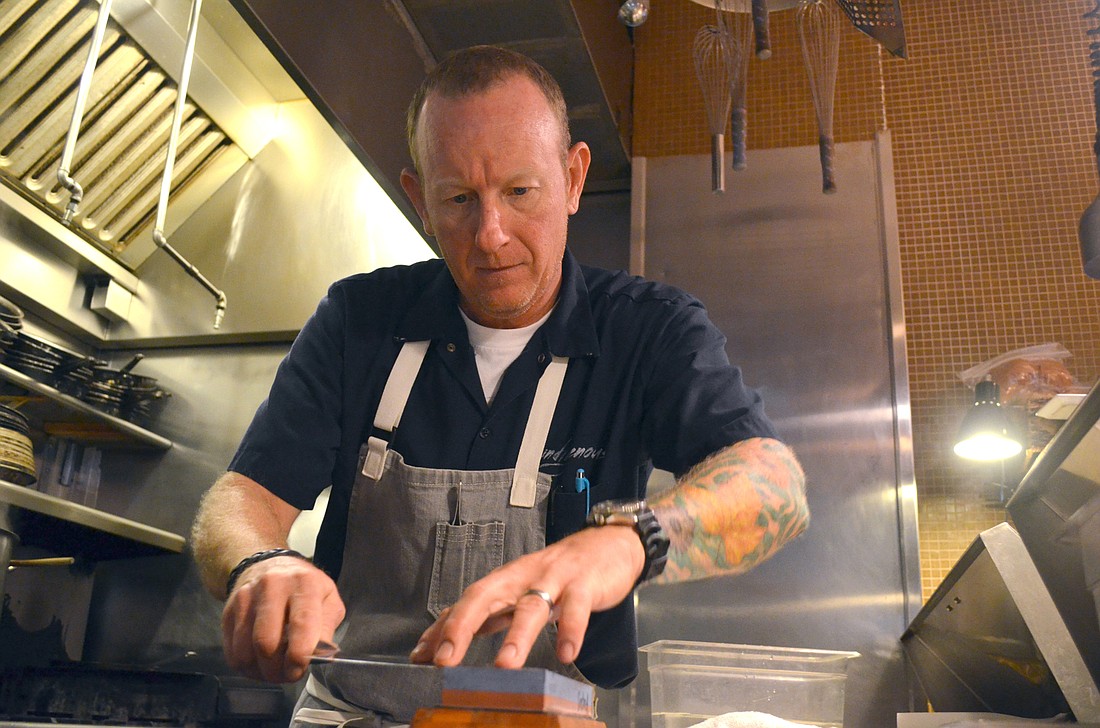- November 25, 2024
-
-
Loading

Loading

For the past three years, Sarasota’s foodies, socialites and ecologically minded diners have eagerly anticipated the annual Trash Fish Dinner.
The event features a handful of the area’s most respected chefs preparing an upscale dinner using bycatch and other less-sought-after seafood species, otherwise known as “trash fish.”
Selling out every year, it’s considered one of the highlights of the summer social scene.
There’s only one problem. Steve Phelps, James Beard-Award-nominated chef and owner of Indigenous restaurant, who in 2014 created the event in partnership with Edible Sarasota magazine and national nonprofit Chefs Collaborative, has been trying to get rid of the name from the get-go.
On a sunny July afternoon, Phelps is sharpening knives in his downtown kitchen and preparing a new menu item for this year’s dinner: an Everglades bake made with carrots, potatoes and other vegetables and spare pieces of fish that wouldn’t otherwise be useable after the normal butchering process.
“I can’t keep up with the orders for this,” he says. “We’ve been selling out of it every night. It’s phenomenal. I’m definitely including it at the dinner.”
It’s a perfect example of the event’s mission — showing diners a sustainable, equally delicious alternative to the overfished — often harmfully sourced — seafood varieties with which they’re more familiar.
But, he says, the name had to go.
“It’s a misnomer,” he says. “It was fun at first, as a novelty. But it’s not doing anyone a service. The fishermen don’t like the name; customers aren’t particularly excited to eat something called ‘trash fish.’ At the end of the day, it’s not an appetizing name, and it hurts the cause.”
This year’s event, now more palatably called the Sustainable Seafood Dinner, takes place Sunday, Aug. 6, at Louie’s Modern. And while the name might be new, the mission hasn’t changed.
“It actually allows us more flexibility,” says Phelps. “If you’re calling the dinner ‘Trash Fish,’ it limits you. You can only use bycatch, or ‘trash fish,’ which you might not even catch. Now, we can use aquafarmed, invasive species, wild local — anything that’s approved as sustainable in the Monterey Bay Aquarium Seafood Watch Program. I’m excited about that.”
Another benefit of the added flexibility, he says, is that the dinner can accommodate more chefs — something Phelps has wanted to do all along. Compared to the usual five, this year’s event features 11 chefs, including Phelps. Among them are:
Evan Gastman, of The Cottage; Joey Egan, of Libby’s Bar + Café; Jose Rojas, of Louie’s Modern; Mark Woodruff, of Made; Paul Mattison, of Mattison’s; Ray Lajoie, of Mattison’s; Eric Walker, of Sandbar; Gino Calleja, of Siesta Key Oyster Bar; Gerard Jesse, of Seafood Shack and Mark Majorie, of Veronica Fish and Oyster.
“I’ve wanted to be part of this since the start,” says Calleja, who has been chef at SKOB for about a year. “It’s important to provide customers with sustainable options and educate them, so we don’t overfish our seas. It’s something we’ve started incorporating at our restaurant — we do ‘Trash Fish Tuesdays.’ I want to emphasize that these are better options, and they still taste good. I’m thrilled to be involved for the first time.”
Phelps says he hopes to see the local sustainability movement grow beyond just the event. The dinner is meant to inform guests, but he also hopes it will serve as a reminder to participating chefs to incorporate these practices into their menus year round.
With advances in technology, fishing methods continue to grow more harmful and larger in scale. Phelps says it’s up to local chefs to help combat these practices.
“Modernized fishing has gotten quite creepy,” he says. “With robotics, vacuums, mechanized arms and FADs (Fish Attracting Devices), there’s no respect for the environment at all.”
Jesse, the chef at Seafood Shack in Cortez, agrees. He says looking to the future is his motivator for pursuing sustainability in his restaurant.
“I have kids,” he says. “I fear for future of the culinary profession, and for food in general. I hate the label, ‘organic.’ It should be just food. So I want to do my part as a chef to make sure my kids and other people’s kids have the right nutrition and education for the future.”
Chefs are still finalizing their dishes, but highlights include ladyfish, sunburst trout, salt-crusted whole barramundi, calico scallops, Biloxi bacon — a type of smoked mullet — and Phelps’ Everglades bake. The dinner will feature a cocktail hour in the Louies ballroom, featuring a DJ, craft beer and sponsor booths as well as five appetizer stations, before the family-style main attraction.
In the years since he started the event, Phelps has continued to broaden his scope in his pursuit of changing the future of seafood.
He’s been involved in the annual Lionfish Derby; he recently visited Washington, D.C., to advocate for the cause, and he has his sights set on other projects: incorporating bycatch into local schools’ lunches; creating a community supported fish market in Bradenton and building a chef’s coalition along Florida’s Gulf Coast.
But he’s happy to be busy. He’s promoting one of his greatest passions — sustainability.
“People have forgotten about seafood,” he says. “We had the farm-to-table movement, which is great, and it’s stable now. But people forget about the oceans — and they live a stone’s throw away from them. I love the fish; I love the ecosystem. Let’s preserve it for our kids.”